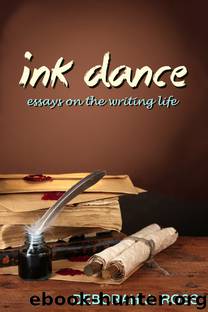Ink Dance by Ross Deborah J

Author:Ross, Deborah J. [Ross, Deborah J.]
Language: eng
Format: epub
Tags: the writing life, creativity, writing
ISBN: 9781611383508
Publisher: Book View Cafe
Published: 2014-01-14T08:00:00+00:00
Blackberry Writing
Blackberries are tricksy things. They can look ripe from where I stand, but turn out to be all red at the base. Sometimes I can tell the moment I touch the berry—it’s too firm and too tightly attached to the stem. I have to be ready to give up on what looked like a great prospect and move on. When I’m in the flow of picking, it seems I don’t even have to think about this. Isn’t this like a story that seems promising but doesn’t yet have the necessary depth? Occasionally—well, more than occasionally—my mind gets dead set on “this berry gets picked” and I force the issue. I’ll glare at the red parts and either pop the berry into my mouth (“for private reading only”). Berries that are almost-ready go well in oatmeal. I freeze quarts and quarts of them for winter breakfasts. They’re too sour on their own, but they blend well, adding pleasantly tart notes. That’s not unlike taking several different story ideas, none of which can stand on their own, and setting them at cross-purposes to make a much more interesting tale.
This whole business of “readiness” in a story is a curious one. It’s a bit like cooking without a recipe, because while there may be guidelines, there are no hard and fast rules of how to tell when a story concept is “ripe.”
Editor Laura Anne Gilman describes how unprofessional it is to argue with a rejection:
All too often at the Big NYC Publisher’s Office, after rejecting a work—especially if it was a) slush and b) got our standard slush reject letter, which was polite but clear that it wasn’t something we were interested in — we’d get a response from the submitter.
Now, professionals know that, unless you are specifically invited into an exchange, you don’t respond to a rejection. You take it, you consider what’s worth considering, and you move on. That exchange is over.
Sometimes, the response would be to ask for more details. Time-crunches didn’t allow us to do that, but it was an acceptable if frustrating response.
More often, though, we got a response along the lines of “My work is utter genius, and you’re too blinded by (fill in the blank) to see it! But you’ll be sorry!”
This kind of reaction isn’t limited to beginning writers, but it is an insidious trap. It’s far easier to think that your story got rejected because of the blindness/stupidity/conspiracy of the gatekeepers, rather than that it simply isn’t good enough. It could be a great idea and you weren’t ready to do it any kind of justice. It could be a trivial idea that no writer alive could have turned into a decent story. It could have been a nifty idea but it wasn’t properly developed—it wasn’t “ripe.”
One of the hardest things for a new writer to master is accepting that there is a threshold of quality—for ideas, for execution—for publication. It’s hard to hear that the story you are so proud of isn’t good enough.
Download
This site does not store any files on its server. We only index and link to content provided by other sites. Please contact the content providers to delete copyright contents if any and email us, we'll remove relevant links or contents immediately.
Asking the Right Questions: A Guide to Critical Thinking by M. Neil Browne & Stuart M. Keeley(5758)
Autoboyography by Christina Lauren(5227)
Eat That Frog! by Brian Tracy(4525)
Dialogue by Robert McKee(4389)
Sticky Fingers by Joe Hagan(4188)
Journeys Out of the Body by Robert Monroe(3615)
Annapurna by Maurice Herzog(3464)
Full Circle by Michael Palin(3443)
Schaum's Quick Guide to Writing Great Short Stories by Margaret Lucke(3374)
Elements of Style 2017 by Richard De A'Morelli(3339)
The Art of Dramatic Writing: Its Basis in the Creative Interpretation of Human Motives by Egri Lajos(3058)
Atlas Obscura by Joshua Foer(2952)
Why I Write by George Orwell(2944)
The Diviners by Libba Bray(2927)
The Fight by Norman Mailer(2927)
In Patagonia by Bruce Chatwin(2920)
The Mental Game of Writing: How to Overcome Obstacles, Stay Creative and Productive, and Free Your Mind for Success by James Scott Bell(2897)
Venice by Jan Morris(2568)
The Elements of Style by William Strunk and E. B. White(2470)
